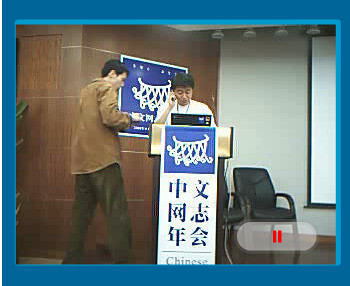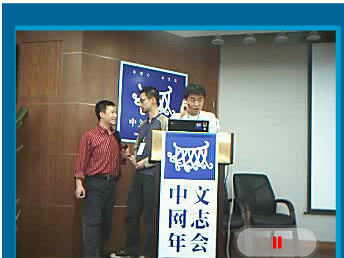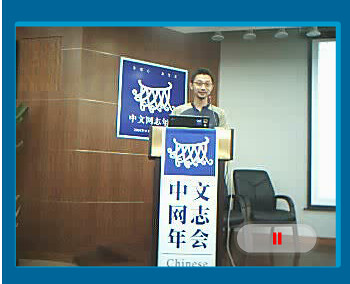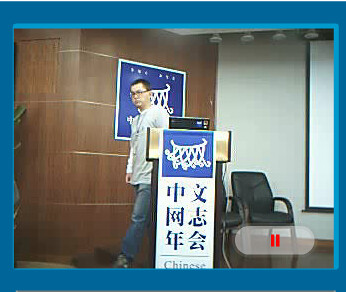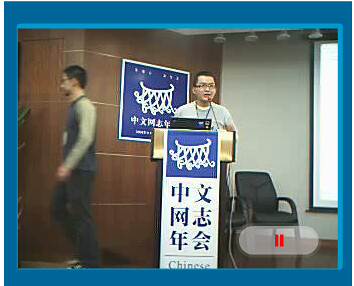Chineese Bloggers' Conference 2005 in Shanghai, China
Presentation VI, "Blogging and Media" by SayOnly (Zhi Shuo)
Published Saturday, November 05, 2005 by Angelo Embuldeniya.
Sayonly has started talking about the relationship between blogs and media:
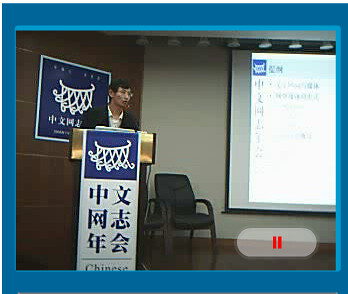
He will talk about webzine, xplus, and blogs, different kinds of online media and about perceptions in china about blogs. Poll results and talks w/ IT experts in china, he will also show how people in china view blogs.
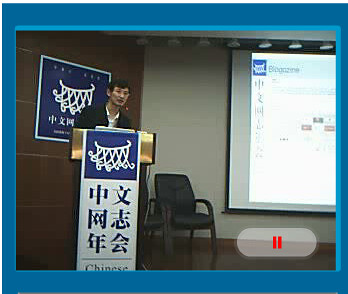
Its pretty early to talk about blogs as media in china right now is what some people say because people say they're still very amateur. First takes a look at how the media reports on blogs. He talks about recent businessweek article on blogs and about the point of that article.
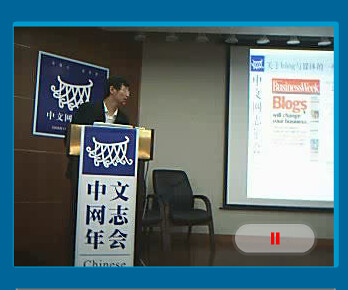
Now he's showing boingboing, digforfire - which is a webzine on music in chinese, xplus - a chinese website started in 2003. Its a desktop client to subscribe to online magazines.
Next slide: webzines
Shows examples of a couple u.s. ones: the revealer and "the raw story" while talking in depth about the history of webzines in the u.s. He's introducing them to the chinese audience and is talking about editorial structure of webzines.
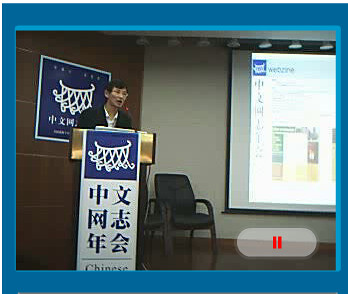
He's now talking about the chinese webzine subscription platform xplus & explaining how it works. Continues to explain in some detail how xplus works - its a desktop client that enables you to subscribe to webzines and now moving on to some blog related ventures - AlwaysOn. He's talking about opsn-source media and insider network with always on, there is a super-blog, with lots of people blogging within it, but while each has an rss feed subscribers not big.
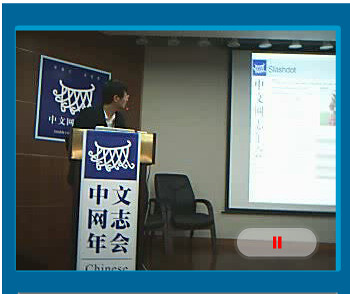
Now SayOnly talks about slashdot and the founder and the history of how slashdot came to work. Explaining how slashdot's community site works in great detail. When it was small, how the spam could be managed by hand but as it grew things had to get more mediated by a group,then eventually thing had to be automated.
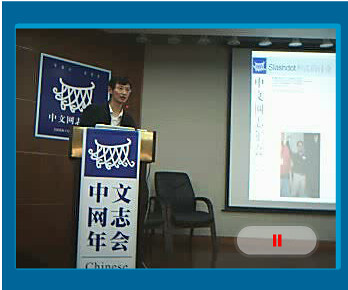
Talks about how it started in 1998 with first post, then grew in 6 months to an explosively large site. He is still explaining the community reputation system within slashdot which determines how prominently your post is featured. Talking about the democratic model of media which slashdot presents, and how its a good model for chinese sites. more about slashdots' (success).
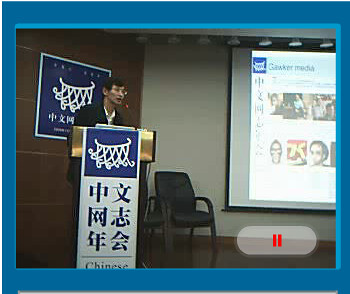
Now SayOnly is talking about gawker media:
He's introducing the various authors of the blogs within gawker media, like wonkette's ana marie cox, gizmodo's joel johnson, jalopnik, fleshbot, defamer, screenhead, lifehacker, etc. He's talking about each gawker media author one by one in great detail.
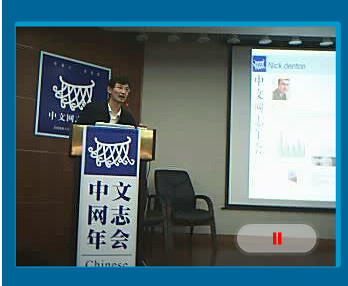
Now talking about Nick Denton who's the founder of Gawker Media. Talking about the spat between nick denton and dave winer - about rss, etc.
SayOnly is now doing the summary:
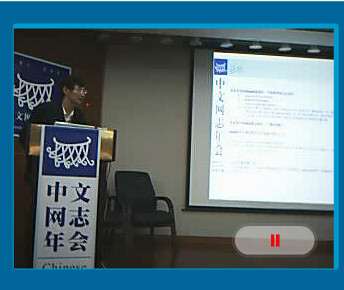
-lessons: all of these successful online media have a strong capable leader behind them
-Successful blog media have a really all star author team
Now he's showing results of a poll about blogs
![]() http://static.flickr.com/29/60307205_6a384cedee.jpg">
http://static.flickr.com/29/60307205_6a384cedee.jpg">
Now looking at results of impact on blogs:
-75% said blog can be media
-16.2 think that blog isnt media ... etc...
-86% thought that blogs commercial potential still not ripe
Talking about his discussions about blogs w/ 2 different bloggers:
-fangjun of ideastalk.com
-michael anti believes that blogs can fill in gaps that media doesnt fill
-mushiyuliang "priestliu":
He thinks govt should have more open view towards blogs in china
-laoyao: another blogger, thinks blogs can give us windows into peoples lives better than other media
-lilao, another blogger (too fast, didnt catch)
-anke, reporter - is creating a search tool
he believes that blogs can supplement other media
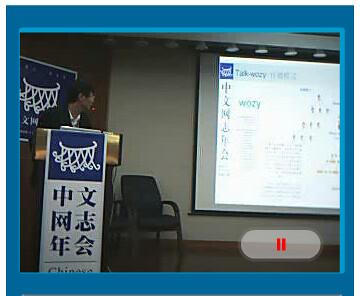
-webleon another blogger.. (didnt' catch, hes going really fast and mumbling now)
-wozy: has a very complicated view about blogs and their impact
Sayonly says that 2006 will be a very important year for blogs in china
[UPDATE: Rebecca just created a bloglines aggregator with as many participant blogs as she knows of here: http://www.bloglines.com/public/CNBloggercon
If you know others she's missing, please email her on rebecca.mackinnon(at)gmail.com]
Tagged: cnbloggercon

He will talk about webzine, xplus, and blogs, different kinds of online media and about perceptions in china about blogs. Poll results and talks w/ IT experts in china, he will also show how people in china view blogs.

Its pretty early to talk about blogs as media in china right now is what some people say because people say they're still very amateur. First takes a look at how the media reports on blogs. He talks about recent businessweek article on blogs and about the point of that article.

Now he's showing boingboing, digforfire - which is a webzine on music in chinese, xplus - a chinese website started in 2003. Its a desktop client to subscribe to online magazines.
Next slide: webzines
Shows examples of a couple u.s. ones: the revealer and "the raw story" while talking in depth about the history of webzines in the u.s. He's introducing them to the chinese audience and is talking about editorial structure of webzines.

He's now talking about the chinese webzine subscription platform xplus & explaining how it works. Continues to explain in some detail how xplus works - its a desktop client that enables you to subscribe to webzines and now moving on to some blog related ventures - AlwaysOn. He's talking about opsn-source media and insider network with always on, there is a super-blog, with lots of people blogging within it, but while each has an rss feed subscribers not big.

Now SayOnly talks about slashdot and the founder and the history of how slashdot came to work. Explaining how slashdot's community site works in great detail. When it was small, how the spam could be managed by hand but as it grew things had to get more mediated by a group,then eventually thing had to be automated.

Talks about how it started in 1998 with first post, then grew in 6 months to an explosively large site. He is still explaining the community reputation system within slashdot which determines how prominently your post is featured. Talking about the democratic model of media which slashdot presents, and how its a good model for chinese sites. more about slashdots' (success).

Now SayOnly is talking about gawker media:
He's introducing the various authors of the blogs within gawker media, like wonkette's ana marie cox, gizmodo's joel johnson, jalopnik, fleshbot, defamer, screenhead, lifehacker, etc. He's talking about each gawker media author one by one in great detail.

Now talking about Nick Denton who's the founder of Gawker Media. Talking about the spat between nick denton and dave winer - about rss, etc.
SayOnly is now doing the summary:

-lessons: all of these successful online media have a strong capable leader behind them
-Successful blog media have a really all star author team
Now he's showing results of a poll about blogs
Now looking at results of impact on blogs:
-75% said blog can be media
-16.2 think that blog isnt media ... etc...
-86% thought that blogs commercial potential still not ripe
Talking about his discussions about blogs w/ 2 different bloggers:
-fangjun of ideastalk.com
-michael anti believes that blogs can fill in gaps that media doesnt fill
-mushiyuliang "priestliu":
He thinks govt should have more open view towards blogs in china
-laoyao: another blogger, thinks blogs can give us windows into peoples lives better than other media
-lilao, another blogger (too fast, didnt catch)
-anke, reporter - is creating a search tool
he believes that blogs can supplement other media

-webleon another blogger.. (didnt' catch, hes going really fast and mumbling now)
-wozy: has a very complicated view about blogs and their impact
Sayonly says that 2006 will be a very important year for blogs in china
[UPDATE: Rebecca just created a bloglines aggregator with as many participant blogs as she knows of here: http://www.bloglines.com/public/CNBloggercon
If you know others she's missing, please email her on rebecca.mackinnon(at)gmail.com]
Tagged: cnbloggercon
Mak presents his blog: mak's man&machine interface
http://makzhou.blogbus.com
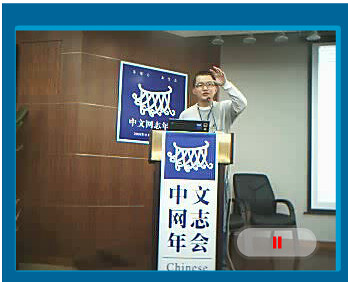
He says he went from being amateur to "pro-am" and hopes to become a professional, he used to just blog about himself but after 2000 august he started to meet more bloggers and came to develop a sense of social responsiblity. He gained this sense of social responsibility through writing his blog and he visited a lot of schools in the western part of china.
He shows some photos he took.
Mak's blog is not only citizen jounalism, but he educates others, educates himself, and is also sociologist.
Here are the pictures he showed: http://www.flickr.com/photos/makzhou/sets/918243/
The next blogger is cnblog:
blog.cnblog.org
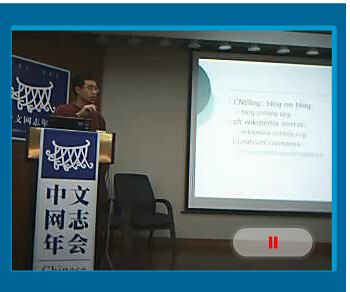
www.creativecommons.cn
wikipedia.cnblog.org
He shows the stats for cnblog:
- An aerage 2-3 thousand visitors per day
- they have much bigger traffic thru rss feeds
- showing referrers
- google and baidu searches make up 30%
- google talk and furong jiejie are the hottest terms
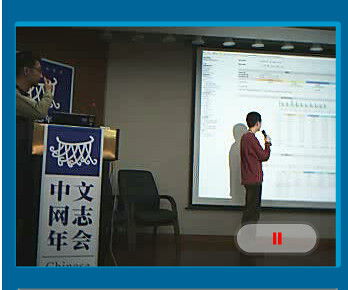
The lessons of doing open source communities in china:
-its definitely a challenge
-people dont always accept your ideas but he hopes more people start such open source communities
He is showing stats now from wikipedia mirror site:
-most visitors coming through baidu
-shows search terms
-all of these stats are public
now showing stats for creative commons china
Tagged: cnbloggercon
http://makzhou.blogbus.com

He says he went from being amateur to "pro-am" and hopes to become a professional, he used to just blog about himself but after 2000 august he started to meet more bloggers and came to develop a sense of social responsiblity. He gained this sense of social responsibility through writing his blog and he visited a lot of schools in the western part of china.
He shows some photos he took.
Mak's blog is not only citizen jounalism, but he educates others, educates himself, and is also sociologist.
Here are the pictures he showed: http://www.flickr.com/photos/makzhou/sets/918243/
The next blogger is cnblog:
blog.cnblog.org

www.creativecommons.cn
wikipedia.cnblog.org
He shows the stats for cnblog:
- An aerage 2-3 thousand visitors per day
- they have much bigger traffic thru rss feeds
- showing referrers
- google and baidu searches make up 30%
- google talk and furong jiejie are the hottest terms

The lessons of doing open source communities in china:
-its definitely a challenge
-people dont always accept your ideas but he hopes more people start such open source communities
He is showing stats now from wikipedia mirror site:
-most visitors coming through baidu
-shows search terms
-all of these stats are public
now showing stats for creative commons china
Tagged: cnbloggercon
Participants & organizers of CBC 2005 on day 2 going off for lunch:
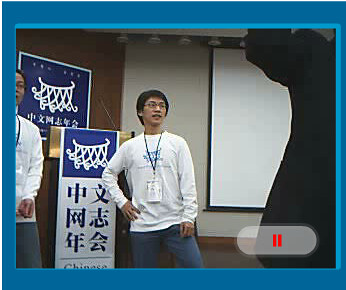
Blogger Zola, rushing off for a bite before the next speaker session starts:
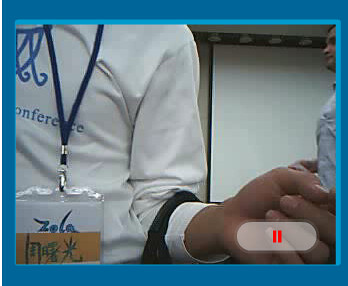
And, speaking of Zola, he's got some nice photos from yesterday's CBC 2005 conference at his weblog!
And the stage & podium is set for the next series of presentations after lunch:
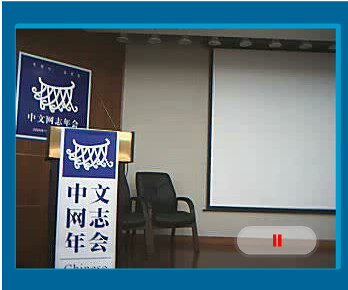
Tagged: cnbloggercon

Blogger Zola, rushing off for a bite before the next speaker session starts:

And, speaking of Zola, he's got some nice photos from yesterday's CBC 2005 conference at his weblog!
And the stage & podium is set for the next series of presentations after lunch:

Tagged: cnbloggercon
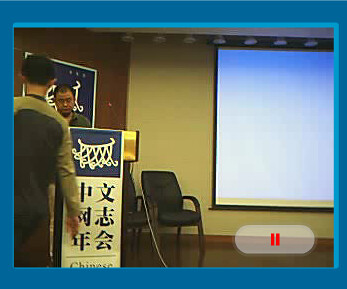
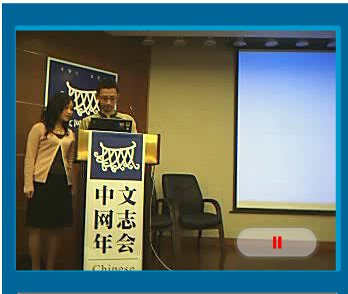
As the conference is running late, organizers have decided that the second break will be skipped and we're going to the next blogger presentation.
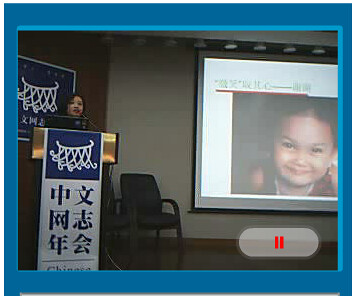
smilinglibrary.blogbus.com
This is a NGO blog aimed at collecting old books for kids in poor areas. Its a non-profit organization around a blog. 1370 kg of books (for the kids).
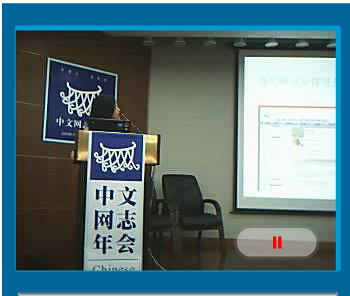
They started by using blogbus and people started promoting the project on their blogs. Then others started linking to it.
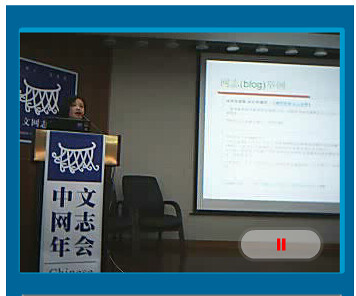
So then a bunch of volunteers set up on blogbus and helped promote the smilinglibrary.
Next blogger/project is 1kg:
www.1kg.cn
An zhu is presenting:
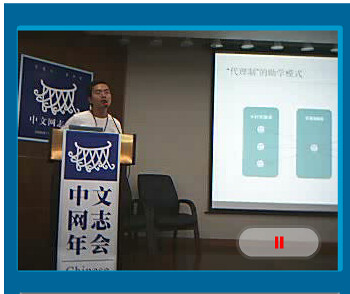
This project collects information from ngos about poor schools and then puts out info so that people gan give books and other things to those schools. There is a question of corrupt school officials and whether they have adequate monitoring.
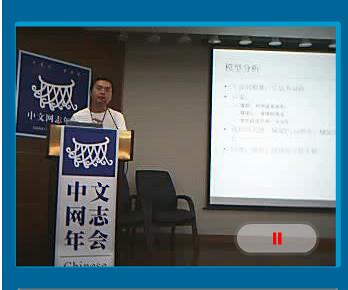
The thing is this project is based on trust. So they increasingly have face-to-face activities with the schools. Travelers are asked to take an extra kg of schoolbooks and materials when they go to an area to give to the designated needy shcools.
Tagged: cnbloggercon
Adjusting his screen, Lu apologizes for lack of break, bcz he has an appointment
He wants to turn this talk into a social network and make it interactive with other people in the room. He would invite the featured bloggers
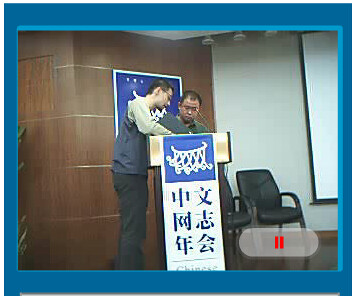
Lu Xinxin is now talking
He was the CEO from feedsky, this may be his first time talking about his views on rss in public
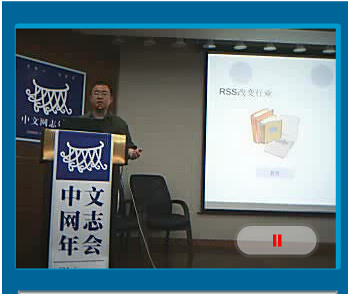
He asks if anybody in room doesnt know what rss is
Lu invites blogger xiao bai, bxy (claims he doesnt like to talk. right.)
He is showing a feedsky feed
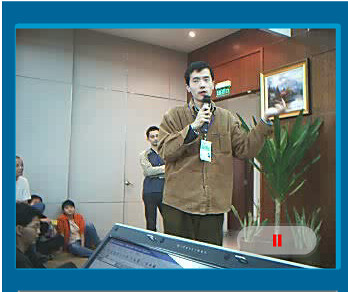
Bxy is talking about how dave winer invented rss, he's a big fan of dave winer (scripting.com)
Dave winer created rss to give every single person a tool
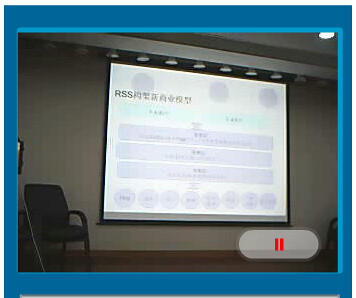
Lu resumes talking
Shows slide of how people interact with microcontent via rss
the path from content creators becoming content receivers
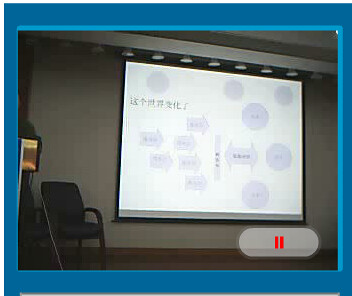
Bxy talks about different www.hao123.com and 265.com:
Do you waste your time clicking through links looking for new content?
yes
but rss is much better because it only pushes you new content
so rss is much more useful than hao123.com
everybody here are creators of the web
the web is becoming a truly open web, thanks to xml
You dont have to gather all users or creaters in one place in order to see everything you want
Now he's talking about tags
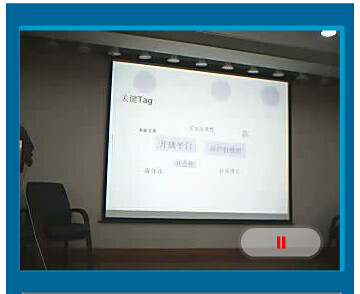
-social media
-open platform
users self-organizing through tagging
Lu now talking about the rss structure and what its commercial model might be.
Tangos are talking about how lots of mainstream media are creating rss feeds of their content
-statistics of content
-ad in RSS feed
-rss advertisements
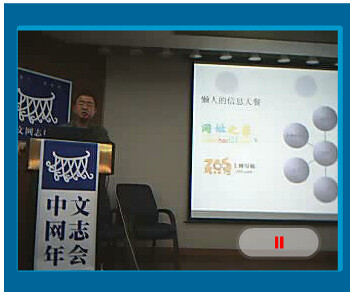
Lu xinxin says that outside the commercial model there are undoubtedly many more applications of rss that we haven't yet thought of.
Now he's talking aobut how rss will impact various professions
example: education
Teacher can set up students with ress readers then send out everything the students need from the lecture materials and so forth via rss feed.
He is asking zhuang xiuli to talk
She is talking about how she introduces rss to teachers in her own clas, every student has a class and she subscribes to rss feeds of all of them
RSS is a great way for teachers to get to know students better in big classes theres little opportunity for face to face interaction.
kids can hold class discussion on blogs, facilitated through rss
Lu xinxin now talking about use of rss within companies as way for people to keep on top of each others' info. Now talking about the future of rss. Lu invites famous blogger from guangxi. (kenlee.cn)
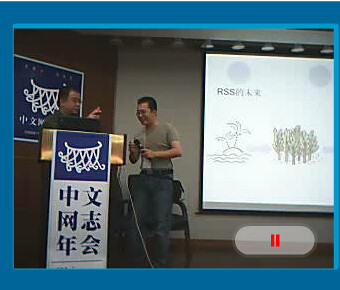
Ken is talking:
-he says blog is like island.
-it generates rss, like small tree saplings
So you need to search to find out what fruits you want to pick but that takes a lot of time. so a lot of tools help us create our own personal orchards from what we want
Then as we enjoy these fruits we will have new ideas and reactions, leading us to create new content which becomes new seedlings, and the cycle is repeated,so its an endless cycle of dissipation and aggregation


-(the tao of rss)
-(tao of the web..)
Lu xinxin says that identity is now determined by people's urls
now talking about rss and copyright issues
invites xba (http://blog.hexun.com/xba)
xba talking:
when youre putting out rss feeds you're not retaining all rights or pepole cant use your rss
theres a lot of debate about copyright and rss (talking about lawrence lessig)
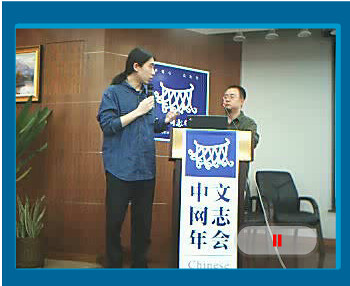
talking about the creative commons license giving non-comercial attribution license
question of whether the license should be for attribution all rights reserved, or for atribution non-commercial
some people subscribing to rss cant see license
so they cant say they're violating copyright
so if you want people to know your license it needs to be written into each piece of content
atom format enables license to be written into each piece of content
flickr allows you to pick license
anyway this is a really really complex issue
Under current conditions: he suggests you might need to attach license to each piece of content if you're really concerned about usage of your content
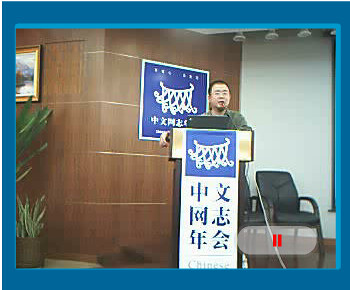
Luxinxin says its not clear who first brought rss to china
-may have been zheng.
-would like zheng to write more on his blog about how that happened
-rss in china: seems to be in very early stage of development
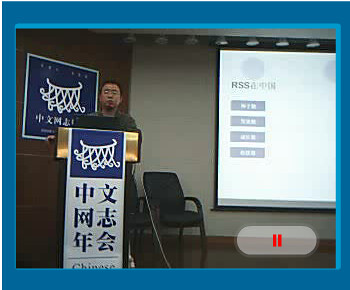
He shows graphic from Feedsky
His company which is tracking chinese feeds
rss will develop very quickly in china just like in rest of the world
When he says he is doing site about feeds people ask him if hes' doing a food site
He invites herock to talk
http://www.herock.net/
Herock says: under current circumstances theres no commercial application for rss, A lot of people have rss feeds on their blogs and dont even know. Talks about sohu blogs, doesnt like them. People need to pay attention to details. Lu says he's worried that companies will mess up rss w/ commercial apps.
Lu's URL's:
www.lvxinxin.com
email: lvxinxin@yikey.com
msn: xasf2000@yahoo.com.cn
He wants to turn this talk into a social network and make it interactive with other people in the room. He would invite the featured bloggers

Lu Xinxin is now talking
He was the CEO from feedsky, this may be his first time talking about his views on rss in public

He asks if anybody in room doesnt know what rss is
Lu invites blogger xiao bai, bxy (claims he doesnt like to talk. right.)
He is showing a feedsky feed

Bxy is talking about how dave winer invented rss, he's a big fan of dave winer (scripting.com)
Dave winer created rss to give every single person a tool

Lu resumes talking
Shows slide of how people interact with microcontent via rss
the path from content creators becoming content receivers

Bxy talks about different www.hao123.com and 265.com:
Do you waste your time clicking through links looking for new content?
yes
but rss is much better because it only pushes you new content
so rss is much more useful than hao123.com
everybody here are creators of the web
the web is becoming a truly open web, thanks to xml
You dont have to gather all users or creaters in one place in order to see everything you want
Now he's talking about tags

-social media
-open platform
users self-organizing through tagging
Lu now talking about the rss structure and what its commercial model might be.
Tangos are talking about how lots of mainstream media are creating rss feeds of their content
-statistics of content
-ad in RSS feed
-rss advertisements

Lu xinxin says that outside the commercial model there are undoubtedly many more applications of rss that we haven't yet thought of.
Now he's talking aobut how rss will impact various professions
example: education
Teacher can set up students with ress readers then send out everything the students need from the lecture materials and so forth via rss feed.
He is asking zhuang xiuli to talk
She is talking about how she introduces rss to teachers in her own clas, every student has a class and she subscribes to rss feeds of all of them
RSS is a great way for teachers to get to know students better in big classes theres little opportunity for face to face interaction.
kids can hold class discussion on blogs, facilitated through rss
Lu xinxin now talking about use of rss within companies as way for people to keep on top of each others' info. Now talking about the future of rss. Lu invites famous blogger from guangxi. (kenlee.cn)

Ken is talking:
-he says blog is like island.
-it generates rss, like small tree saplings
So you need to search to find out what fruits you want to pick but that takes a lot of time. so a lot of tools help us create our own personal orchards from what we want
Then as we enjoy these fruits we will have new ideas and reactions, leading us to create new content which becomes new seedlings, and the cycle is repeated,so its an endless cycle of dissipation and aggregation

-(the tao of rss)
-(tao of the web..)
Lu xinxin says that identity is now determined by people's urls
now talking about rss and copyright issues
invites xba (http://blog.hexun.com/xba)
xba talking:
when youre putting out rss feeds you're not retaining all rights or pepole cant use your rss
theres a lot of debate about copyright and rss (talking about lawrence lessig)

talking about the creative commons license giving non-comercial attribution license
question of whether the license should be for attribution all rights reserved, or for atribution non-commercial
some people subscribing to rss cant see license
so they cant say they're violating copyright
so if you want people to know your license it needs to be written into each piece of content
atom format enables license to be written into each piece of content
flickr allows you to pick license
anyway this is a really really complex issue
Under current conditions: he suggests you might need to attach license to each piece of content if you're really concerned about usage of your content

Luxinxin says its not clear who first brought rss to china
-may have been zheng.
-would like zheng to write more on his blog about how that happened
-rss in china: seems to be in very early stage of development

He shows graphic from Feedsky
His company which is tracking chinese feeds
rss will develop very quickly in china just like in rest of the world
When he says he is doing site about feeds people ask him if hes' doing a food site
He invites herock to talk
http://www.herock.net/
Herock says: under current circumstances theres no commercial application for rss, A lot of people have rss feeds on their blogs and dont even know. Talks about sohu blogs, doesnt like them. People need to pay attention to details. Lu says he's worried that companies will mess up rss w/ commercial apps.
Lu's URL's:
www.lvxinxin.com
email: lvxinxin@yikey.com
msn: xasf2000@yahoo.com.cn
Business-related problems associated with web 2.0
The likelihood of which users need to pay for themselves
micro-payment is another important tool for web 2.0 development
-it provides a platform for spontaneous transactions
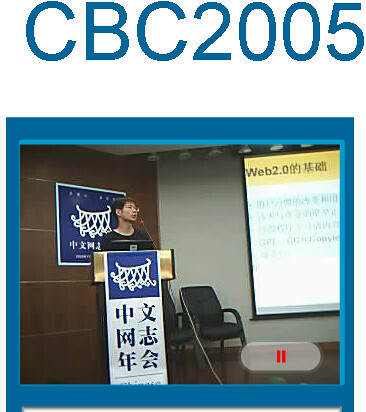
The Spirits of web 2.0
-To transform ourselves through adopting web 2.0 online
-also about the idea to share and to be open & to be original in blogging
What I'm going to talk next has more relevance to you.
What constitutes the web?
We believe that we are the pillars of the web. think of the case of blogging.
We have blog posts, pictures on delicious, to-dos on 43things, and reviews on Deouban
We use our own information to form the content, posting on our personal pages thus constituting different websites
1.microcontents, 2.personal pages, 3.websites
Leads to: Personal database center, personal portal -> we the web
Users have become important contributors to webcontents, reading list, blogroll and thus making them important and this is why we need to have more users-centered design
Social Relation:
Microcontents: blog, bookmarks, photos, todolists, podcasts
Social relations: individual, kin, friends, classmates, colleagues
How to we structure the vast amount of information of the microcontents?
tags and in particular RSS. Bookmarking is also one of the tool.
Distinction with BBS and the newly-emerged use of SNS Social Network (synthesis?)
Web 2.0 application in entertainment , human resources
We can see that the tools that manage microcontents can be put as tools for information/knowledge where as the way we form social network (group, SNS, community, IMs) belongs more to social network formation. Of course the distinction is not clear-cut . We would talk not just about information, but also the social implications embedded in it. For interpersonal relationship, internet would enlarge our definitions of social structures
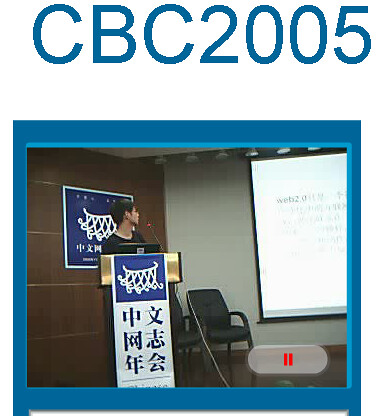
Now i would proceed to the most interesting part of the talk
****semantic? Contextual web****
contextual web
Semantic web: contextual web
social relation intergrate into internet
Social relations have completely diffused into the internet sphere
Any person's post or link has complex semantic relationship.
we have enlarged semantic meanings for the contents online
we would know that there is a living person writing it, and we would know the social relations of this person would that be a PR passage trying to pretend that it's a neutral blog?
semantic structure
- 1, knowledge
- 2, personal relations
Reading habits: link-driven world. Mutual reinforcement and repetition the linking and semantic web are the main reason why newspapers are threatened, because our reading habits have been completely changed by the web of links example: talkdigger.com & also http://tech.memeorandum.com
questions: can the semantic web scale?
also: what is being recorded (saved)?
can look at the relationship between information/content and the time when it appeared, etc.
Horse shows a table showing different services and their usefulness for different kinds of searches
semantic? contextual web... far away...
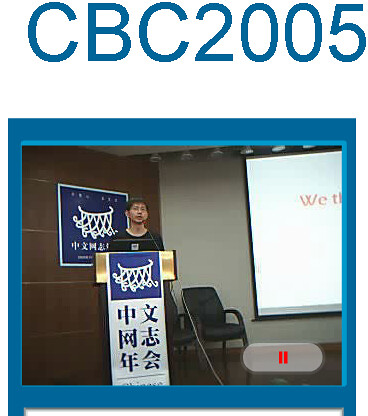
he now wants to talk about his personal observations about the semantic web
things to watch in social behavior on the web, analyze user behavior
how people manifest their personal identity online
look at how people represent themselves online and how they create their identities
look at social relations online
many people ask about what will the social and political implications be of these changes?
horse thinks that it will be very subtle and slow, bubbling up from the bottom and hard to point at concrete changes initially
creativity, dialogue are key terms
things that are anti-web 2.0
unfair business practices
horse thinks that the government actions arent as threatening
he doesnt think that the law will prevent people from doing most things
more concerned about business practices: spam, copyright laws
the key to protecting web 2.0: let the individual become the "points of light" and protect them
his website http://zhanbin.com
Tagged: cnbloggercon, 中文网志年会, CBC2005
The likelihood of which users need to pay for themselves
micro-payment is another important tool for web 2.0 development
-it provides a platform for spontaneous transactions

The Spirits of web 2.0
-To transform ourselves through adopting web 2.0 online
-also about the idea to share and to be open & to be original in blogging
What I'm going to talk next has more relevance to you.
What constitutes the web?
We believe that we are the pillars of the web. think of the case of blogging.
We have blog posts, pictures on delicious, to-dos on 43things, and reviews on Deouban
We use our own information to form the content, posting on our personal pages thus constituting different websites
1.microcontents, 2.personal pages, 3.websites
Leads to: Personal database center, personal portal -> we the web
Users have become important contributors to webcontents, reading list, blogroll and thus making them important and this is why we need to have more users-centered design
Social Relation:
Microcontents: blog, bookmarks, photos, todolists, podcasts
Social relations: individual, kin, friends, classmates, colleagues
How to we structure the vast amount of information of the microcontents?
tags and in particular RSS. Bookmarking is also one of the tool.
Distinction with BBS and the newly-emerged use of SNS Social Network (synthesis?)
Web 2.0 application in entertainment , human resources
We can see that the tools that manage microcontents can be put as tools for information/knowledge where as the way we form social network (group, SNS, community, IMs) belongs more to social network formation. Of course the distinction is not clear-cut . We would talk not just about information, but also the social implications embedded in it. For interpersonal relationship, internet would enlarge our definitions of social structures

Now i would proceed to the most interesting part of the talk
****semantic? Contextual web****
contextual web
Semantic web: contextual web
social relation intergrate into internet
Social relations have completely diffused into the internet sphere
Any person's post or link has complex semantic relationship.
we have enlarged semantic meanings for the contents online
we would know that there is a living person writing it, and we would know the social relations of this person would that be a PR passage trying to pretend that it's a neutral blog?
semantic structure
- 1, knowledge
- 2, personal relations
Reading habits: link-driven world. Mutual reinforcement and repetition the linking and semantic web are the main reason why newspapers are threatened, because our reading habits have been completely changed by the web of links example: talkdigger.com & also http://tech.memeorandum.com
questions: can the semantic web scale?
also: what is being recorded (saved)?
can look at the relationship between information/content and the time when it appeared, etc.
Horse shows a table showing different services and their usefulness for different kinds of searches
semantic? contextual web... far away...

he now wants to talk about his personal observations about the semantic web
things to watch in social behavior on the web, analyze user behavior
how people manifest their personal identity online
look at how people represent themselves online and how they create their identities
look at social relations online
many people ask about what will the social and political implications be of these changes?
horse thinks that it will be very subtle and slow, bubbling up from the bottom and hard to point at concrete changes initially
creativity, dialogue are key terms
things that are anti-web 2.0
unfair business practices
horse thinks that the government actions arent as threatening
he doesnt think that the law will prevent people from doing most things
more concerned about business practices: spam, copyright laws
the key to protecting web 2.0: let the individual become the "points of light" and protect them
his website http://zhanbin.com
Tagged: cnbloggercon, 中文网志年会, CBC2005
Chedong is talking about the nonprofit web activities and describes the cnblog experience:

- its hard to set up nonprofit organizations in china
- the legal structure isnt set up for it
- fund raising is also a big problem
- big problem for nonprofits to fundraise, especially on the web
- Chen Zhiwei runs a blog media company (kind of like gawker)
Chedong thanks Zhang Erning
Lao Mao is now taken over the mic and is sharing his experiences:

- He blogs at www.uuzone.ocm/blog/mao & moblogs at http://www2.uuzone.com/blog/mao
- He says that every blog is a person
- the links are "guanxi" - your connections with people
- trackback is communication
- so blogs are a huge social network
- future blogs will be very different that what we have today
- but the main thing is that they will create relationship links and web amongst people

Topku Chan has started delivering his session & now he apologizes bcause he's Cantonese, he says his mandarin isnt very good.
- hes talking about why companies should care about blogs
- as blogs develop in china society will be =come more and more individualistic so companies will need to diversify their p.r.
- the web is distributed so companies need to have dialogue with networks of users/consumers ets
- companies must communicate with people in their own language
- companies need to learn the art of linking
- they should see what their inbound links are saying about their products
- companies need to be smarter about using google search, tags, rss, links and etc.
- you should look for negative things that bloggers are saying about your product and use it as feedback for improvement, rather than try to control or stop the negative views

Topku talks about 2 points companies need to understand:
- the very nature of p.r. is changing
- keyvoice is bigger than "keyword"
- "keyvoice" is his own invention
- you need to pay attention to the key voices talking about your product

- its hard to set up nonprofit organizations in china
- the legal structure isnt set up for it
- fund raising is also a big problem
- big problem for nonprofits to fundraise, especially on the web
- Chen Zhiwei runs a blog media company (kind of like gawker)
Chedong thanks Zhang Erning
Lao Mao is now taken over the mic and is sharing his experiences:

- He blogs at www.uuzone.ocm/blog/mao & moblogs at http://www2.uuzone.com/blog/mao
- He says that every blog is a person
- the links are "guanxi" - your connections with people
- trackback is communication
- so blogs are a huge social network
- future blogs will be very different that what we have today
- but the main thing is that they will create relationship links and web amongst people

Topku Chan has started delivering his session & now he apologizes bcause he's Cantonese, he says his mandarin isnt very good.
- hes talking about why companies should care about blogs
- as blogs develop in china society will be =come more and more individualistic so companies will need to diversify their p.r.
- the web is distributed so companies need to have dialogue with networks of users/consumers ets
- companies must communicate with people in their own language
- companies need to learn the art of linking
- they should see what their inbound links are saying about their products
- companies need to be smarter about using google search, tags, rss, links and etc.
- you should look for negative things that bloggers are saying about your product and use it as feedback for improvement, rather than try to control or stop the negative views

Topku talks about 2 points companies need to understand:
- the very nature of p.r. is changing
- keyvoice is bigger than "keyword"
- "keyvoice" is his own invention
- you need to pay attention to the key voices talking about your product
Kevin Wen is starting, introducing himeslf and welcoming foreign particvipants like Rebecca and Owen from feedster.

Kevin is now talking about the development of cnblog. Kevin says blog is another kind of document web - rss, xml and as a result pepole can connect to each other through links and rss feeds in ways not possible before. Hard to tell where the future is going , but we seem to be going in the direction of semantic web blogs: qblogs
skipped a couple of slides
He's talking about the "click" phenomenon
In the beginning you could only click on links within sites.
Then search helped us find things we were looking for ability to search information
"express intent. does not depend on result" (from slide)
stage 3: tag - we can label items to manage, remember, and share

How we start? (how his company started):
They started with a brainstorm session in small apartment.
And formed an organized team.
Felt that they should help more people do blogs
Their whole team met each other online.
They hadnt ever met in person and had various online meetings then figured out how they could develop a product to help users blog. Thats how they created blogdriver. It was a whole group with no marketing but developed 400 thousand users.
But some things that seem simple are much harder than you imagine
When youre working remotely with people how do you pay them?
Communication was always big challenge

We used a lot of im and skype and studied how u.s. startups work
Then went to south-by-southwest conference in austin in 2004 and had a chance to interact with other startups for the first time. We met six apart, feedster, etc. and learned how they work.
The biggest lesson: learn from users otherwise you cant develop a good service or product idea of a "personal portal".
In the brainstorms saw that there was demand in china. The startup was tough period: more efforts we put in, the more responsibility we have. After working for a year or so, had to make tough decisions, either find vc or merge with another company. It hit a point where they had to decide whether to merge or get round of vc capital. They realized they had no managerial and operational experience and the necessary connections, etc. So they decided not to seek next round of funding, and instead decided to merge with blogchina
(now bokee).

They felt it was a good platform, with lots of good management experience and Kevin feels that it was the right decision:
- lessons of entrepreneurship:
- learning by doing
- nobody is an expert
- professional amateur
- you must keep your mind open as you move forward
- this is much more effective than book learning before you start something
next lesson: focus.
know the value
you must specialize and be clear on what your differentation is
partners: you need good trusted partners focusing on one thing, do it very well and enjoy it a quote from david sifry
innovation: he is going to play a video of tiger woods
everything is possible, just do it
what innovation is not
just because you have new tech doesnt mean innovation
nor is just r&D
not just creative playroom
innovation is a process
its not just having an amazing idea

seed of innovation: understanding, imagination, action
Kevin is showing the "read my lips" remix video (the one with Tony Blair and George Bush mixed over "endless love"):




...Kevin finishes with his presentation .....

...and the Panelists are geting ready to start.....


Kevin is now talking about the development of cnblog. Kevin says blog is another kind of document web
skipped a couple of slides
He's talking about the "click" phenomenon
In the beginning you could only click on links within sites.
Then search helped us find things we were looking for ability to search information
"express intent. does not depend on result" (from slide)
stage 3: tag - we can label items to manage, remember, and share

How we start? (how his company started):
They started with a brainstorm session in small apartment.
And formed an organized team.
Felt that they should help more people do blogs
Their whole team met each other online.
They hadnt ever met in person and had various online meetings then figured out how they could develop a product to help users blog. Thats how they created blogdriver. It was a whole group with no marketing but developed 400 thousand users.
But some things that seem simple are much harder than you imagine
When youre working remotely with people how do you pay them?
Communication was always big challenge

We used a lot of im and skype and studied how u.s. startups work
Then went to south-by-southwest conference in austin in 2004 and had a chance to interact with other startups for the first time. We met six apart, feedster, etc. and learned how they work.
The biggest lesson: learn from users otherwise you cant develop a good service or product idea of a "personal portal".
In the brainstorms saw that there was demand in china. The startup was tough period: more efforts we put in, the more responsibility we have. After working for a year or so, had to make tough decisions, either find vc or merge with another company. It hit a point where they had to decide whether to merge or get round of vc capital. They realized they had no managerial and operational experience and the necessary connections, etc. So they decided not to seek next round of funding, and instead decided to merge with blogchina
(now bokee).

They felt it was a good platform, with lots of good management experience and Kevin feels that it was the right decision:
- lessons of entrepreneurship:
- learning by doing
- nobody is an expert
- professional amateur
- you must keep your mind open as you move forward
- this is much more effective than book learning before you start something
next lesson: focus.
know the value
you must specialize and be clear on what your differentation is
partners: you need good trusted partners focusing on one thing, do it very well and enjoy it a quote from david sifry
innovation: he is going to play a video of tiger woods
everything is possible, just do it
what innovation is not
just because you have new tech doesnt mean innovation
nor is just r&D
not just creative playroom
innovation is a process
its not just having an amazing idea

seed of innovation: understanding, imagination, action
Kevin is showing the "read my lips" remix video (the one with Tony Blair and George Bush mixed over "endless love"):




...Kevin finishes with his presentation .....

...and the Panelists are geting ready to start.....

About me
- I'm Angelo Embuldeniya
- From
- My profile
Last posts
- CBC 2005: Closing Remarks
- CBC 2005 Bloggers' T-Shirt Auction Via Tagging
- Final Session: Selected Bloggers
- Seminar Discussion: "Tags/Folksonomy" Moderated by...
- Horse on Blogging & Public Relations
- Presentation by the CEO of Blogbus.com
- Presentation VI, "Blogging and Media" by SayOnly (...
- Pics: Conference Pre-Session - Back From Lunch & G...
- Blog Presentations of Mak's Man Machine & CnBlog
- Conference Stops for Lunch!
Links
- Official CBC Site
- Conference Schedule
- Live Video Conference Broadcast
- Live IRC Chat Session of Conference
- Special Skype Room for Conference
- CBC Conference on Google Groups
- Global Voices
-
www.flickr.com
This is a Flickr badge showing public photos from Flickr tagged with cnbloggercon. Make your own badge here.
RSS Feed ATOM Feed
